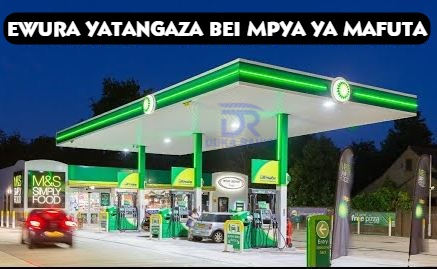BEI MPYA YA MAFUTA EWURA CAP PRICES MARCH 1 2023 IMEPANDA
PUBLIC NOTICE ON CAP PRICES FOR PETROLEUM PRODUCTS EFFECTIVE WEDNESDAY, 1ST MARCH 2023
The Energy and Water Utilities Regulatory Authority (EWURA) hereby publishes Cap Prices for petroleum products, applicable in Tanzania Mainland.
These retail and wholesale prices are applicable effective from Wednesday, 1 March 2023.
Hereinafter, kindly take note of the following:
(a) In March 2023, retail prices of petrol, diesel and kerosene imported through Dar es Salaam port have increased by TZS 149/litre, TZS 25/litre and TZS 37/litre, respectively, compared to the prices that were published on 1st February 2023.
(b) For Northern regions (Tanga, Kilimanjaro, Arusha, and Manyara), retail prices of petrol and diesel for March 2023 have decreased by TZS 64/litre and TZS 209/litre, respectively.
Moreover, due to the depletion of kerosene at the Tanga storage terminal, Petrol Station Operators in the Northern regions are advised to source kerosene from Dar es Salaam.
Therefore, the retail prices of kerosene for those regions are based on the cost of the product received through Dar es Salaam port and the transport cost to the respective regions.
(c) For Southern regions (Mtwara, Lindi, and Ruvuma), retail prices of petrol for March 2023 increased by TZS 138/litre while the pump prices for diesel have decreased by TZS 68/litre.
Due to the unavailability of kerosene at Mtwara storage terminals, Petrol Station Operators in the Southern regions are advised to source kerosene from Dar es Salaam.
Therefore, the retail prices of kerosene for those regions are based on the cost of the product received through Dar es Salaam port and the transport cost to the respective regions. Prices for each town, district or regional centre are given in Table 1.
Prices differ from one location to another due to differences in recommended loading port and 2 | Page transportation costs. Changes in local prices are mainly attributed to changes in the world oil market prices, BPS premiums and the value of Shillings against the US Dollar.
During the effectiveness of these prices, wholesalers, retailers and the general public are required to adhere to the following: –
(a) EWURA would like to remind the public that these cap prices can be accessed through mobile phones by dialling *152*00# and then following the provided instructions. This service is free of charge and is available to all mobile phone service providers in the country.
(b) In line with the prevailing sector legislation (Petroleum Act, 2015, section 166), prices of petroleum products are governed by rules of demand and supply.
EWURA shall continue to encourage competition in the sector by making available petroleum products pricing information including cap prices.
This information on prices is intended to enable stakeholders to make informed decisions on petroleum prices at any particular time.
(c) Oil Marketing Companies are free to sell their products at a price that gives them a competitive advantage provided that, such price does not exceed the price cap and is not below the floor price for the relevant product as it is computed pursuant to the EWURA (Petroleum Products Prices Setting) Rules 2022, which were gazetted through the Government Notices No.57 published on 28th January 2022 respectively.
(d) All petrol stations are required to publish petroleum product prices on clearly visible boards. The price boards should clearly show prices charged, discounts offered as well as any trade incentives or promotions on offer.
Consumers are encouraged to purchase from stations that sell products at the most competitive prices and offer better services. It is an offence not to have prices published on boards located in clearly visible places in front of petrol stations. Failure to adhere to this directive will attract punitive measures from EWURA.
(e) Retailers must issue receipts printed from an Electronic Fiscal Pump Printer (EFPP) for all sales that they make.
In addition, consumers are required to demand and keep those receipts that clearly show the name of the petrol station, the date on which such purchase was made as well as, the type of petroleum product (fuel) and price per litre for every purchase they make.
This can be used as an exhibit in case of a complaint lodged in the event that the selling price is above the cap price or in case the products sold do not meet the approved specifications and provide an assurance that 3 | Page appropriate government taxes on sales of petroleum products are fully accounted for recovery from the Retailers.
(f) Retailers are required to sell petroleum products at prices depicted in Table 1. Legal action will be taken against any retailer who fails to comply with these instructions.
(g) Wholesalers are also required to sell petroleum products at prices indicated in Table 2 except to customers with tax exemptions. Legal action will be taken against any wholesaler who fails to comply with these instructions.
TABLE 1: TABLE 2: RETAIL PRICES IN TZS/LITRE




TABLE 1: TABLE 2: RETAIL PRICES IN TZS/LITRE



TABLE 2: WHOLESALE PRICES IN TZS/LITRE





































































Thanks for your short article. I would also love to say that the health insurance dealer also works for the benefit of the particular coordinators of your group insurance policies. The health insurance professional is given a long list of benefits wanted by someone or a group coordinator. Such a broker really does is hunt for individuals or maybe coordinators which in turn best fit those demands. Then he provides his referrals and if each party agree, the broker formulates a contract between the 2 parties.